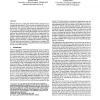Free Online Productivity Tools
i2Speak
i2Symbol
i2OCR
iTex2Img
iWeb2Print
iWeb2Shot
i2Type
iPdf2Split
iPdf2Merge
i2Bopomofo
i2Arabic
i2Style
i2Image
i2PDF
iLatex2Rtf
Sci2ools
142
click to vote
CIKM
1994
Springer
1994
Springer
TID Hash Joins
TID hash joins are a simple and memory-efficient method for processing large join queries. They are based on standard hash join algorithms but only store TID/key pairs in the hash table instead of entire ttrples. This typically reduces memory requirements by more than art order of magnitude bringing substantial benefits. In particular, performance for joins on Gigs-Byte relations can substantially be improved by reducing the amount of disk f/O to a large extent. Furthermore, efficient processing of mixed multi-user workloads consisting of both join queries and OLTP transactions is supported. We present a detailed simulation study to analyze the performance of TID hash joins. In particular, we identify the conditions under which TID hash joins are most beneficial. Furthermore, we compare TID hash join with adaptive hash join algorithms that have been proposed to deal with mixed workloads.
Related Content
| Added | 09 Aug 2010 |
| Updated | 09 Aug 2010 |
| Type | Conference |
| Year | 1994 |
| Where | CIKM |
| Authors | Robert Marek, Erhard Rahm |
Comments (0)

